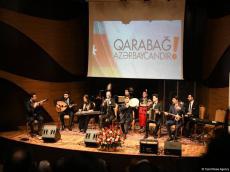|
|
TODAY.AZ / Arts & Entertainment
Year of Shusha.Spectacular celebration at Mugham Center
20 April 2022 [17:23] - TODAY.AZ

By Azernews
By Laman Ismayilova
Spectacular events have been held in Baku within the Year of Shusha in Azerbaijan. The country's cultural capital turns 270 this year.
President Ilham Aliyev signed an order declaring the city of Shusha as Azerbaijan's cultural capital in order to restore Shusha's historical appearance, bring its former glory to the city as well reunite it with the traditionally rich cultural life.
Gala Concert at Mugham Center
The gala concert "Karabakh is Azerbaijan" at the International Mugham Center brought together the soloists of the International Mugham Center, Baku Choreographic Academy, People's artists Nuraddin Mehtikhanli, Anvar Sadikhov, Honored artists Sabuhi Ibayev, Ehtiram Huseynov, Tayyar Bayramov, Sevinj Sariyeva, Ilaha Afandiyeva and many others.
The musicians captivated the audience with mugham music, classical and instrumental works.
The event was co-organized by the International Mugham Center, the Agency for State Support to NGOs and the Khan Shushinsky Foundation.
Executive Director of the Agency for State Support to NGOs Aygun Aliyeva spoke about the fruitful activities of the state in restoring Azerbaijan's liberated territories and implementing major projects.
The audience was presented a video about the ten year activity of the Khan Shushinsky Foundation which aims at promoting the art of mugham.
Stunning fashion exhibition
Famous fashion designer, Honored Art Worker Fakhriya Khalafova mesmerized the guests with her stunning collection titled "Kharibulbul in flourishing Karabakh.
The elegant gowns were harmoniously complemented by silk scarves, a restored version of the Karabakh kelagayi.
The exhibition also included dresses from the fashion collection "Karabakh Princess" presented at Azerbaijan Fashion Week 2021.
Sophisticated dress inspired by Azerbaijani poetess Agha Beyim Aga, a daughter of the second khan of Karabakh Ibrahim Khalil khan, instantly won the hearts of fashionistas.
Widespread among the peoples of the Middle East and the Caucasus, the silk headscarf varied in size and color.
The older women wore a dark kelagayi, mostly black and dark blue, whereas younger women preferred the brighter ones, such as white, beige, etc.
The most ancient and widespread kelagayi patterns were the image of the peacock pair, buta, flower motifs and geometric patterns.
A distinctive feature of the Karabakh kelagayi was the symbol of the sun, an important symbol in many cultures.
The fashion designer stressed that it's important to restore ancient patterns and to produce Karabakh kalagai in a modern style.
She expressed her confidence that kelagayi will be met with great interest by the world community at fashion events.
URL: http://www.today.az/news/entertainment/218930.html
 Print version
Print version
Connect with us. Get latest news and updates.
See Also
- 25 April 2025 [12:34]
Mugham Television Competition kicks off - 25 April 2025 [11:48]
Turkiye to host Days of Azerbaijani Cinema - 25 April 2025 [10:44]
Honored Artist Nijat Kazimov to hold seminar on theater art - 24 April 2025 [13:14]
Lecture on Mirza Kadim Irevani's legacy delivered in Kyrgyzstan - 24 April 2025 [12:19]
Book by national writer presented in Kyrgyzstan - 23 April 2025 [14:51]
Gala State Reserve marks its 37th anniversary with tree planting campaign - 23 April 2025 [11:43]
State Philharmonic Hall pays tribute to eminent composer - 22 April 2025 [14:15]
Int'l Jazz Day in Baku to celebrate freedom and inspiration - 22 April 2025 [13:11]
Baku, Tashkent to hold joint art projects - 22 April 2025 [11:05]
Leyla Aliyeva meets with spouse of Secretary General of Central Committee of Vietnam's Communist Party
Most Popular
 Trump sees hope for Ukraine-Russia deal, analysts remain skeptical
Trump sees hope for Ukraine-Russia deal, analysts remain skeptical
 Azerbaijan's Chamber of Accounts urges strengthening audits on renewables & green budgeting
Azerbaijan's Chamber of Accounts urges strengthening audits on renewables & green budgeting
 Azerbaijan and China sign mutual visa exemption agreement for ordinary passport holders
Azerbaijan and China sign mutual visa exemption agreement for ordinary passport holders
 Oil exports from Azerbaijan to Tabriz may be on agenda during Pezeshkian's visit to Baku
Oil exports from Azerbaijan to Tabriz may be on agenda during Pezeshkian's visit to Baku
 South Korea launch fourth reconnaissance satellite into orbit
South Korea launch fourth reconnaissance satellite into orbit
 Armenia's accusations are misinformation, says Azerbaijani Defense Ministry
Armenia's accusations are misinformation, says Azerbaijani Defense Ministry
 Leyla Aliyeva meets with Vice-President of Vietnam to expand humanitarian and cultural ties
Leyla Aliyeva meets with Vice-President of Vietnam to expand humanitarian and cultural ties
